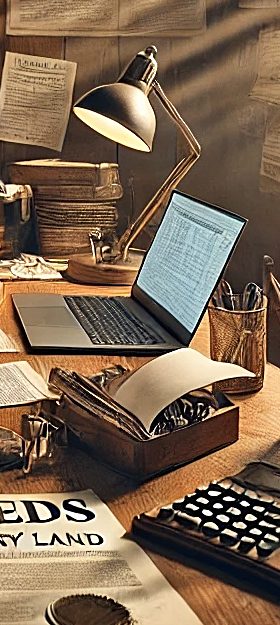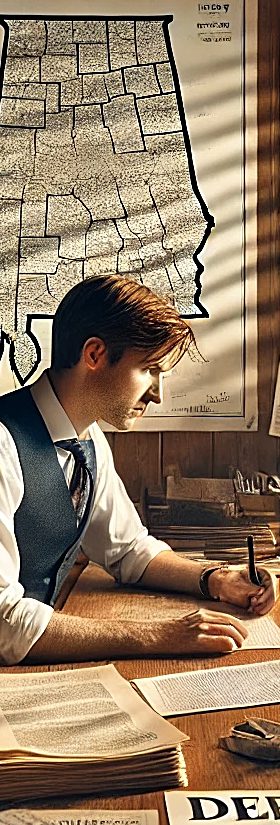
Paperwork to Sell Alabama Land: Don’t Get Stuck Without It!
So, you’re thinking about selling land in Alabama? Whether you’ve inherited property or are simply looking to cash out on a vacant parcel, there’s one thing for sure: selling land in Alabama involves more than just finding a buyer. You’ve got to tackle the paperwork, and it’s not as simple as slapping your signature on a dotted line. In fact, Alabama is home to over 22 million acres of forested land, making it a hotspot for land deals, but those deals don’t happen without the right documents in hand.
Alabama’s rural land market has been gaining traction, with more out-of-state buyers eyeing the affordable acreage. However, skipping over the necessary forms can turn your straightforward land sale into a legal minefield. That’s why understanding the required paperwork to sell land in Alabama is essential—not just to close the deal, but to protect yourself from future headaches. Let’s break down everything you need so you can confidently move forward with your sale, knowing that the legal side is all squared away.

Why Having the Right Paperwork Matters
Selling land in Alabama without the right paperwork is like trying to drive cross-country with no GPS—you’re bound to hit some bumps, or worse, get lost. Alabama’s real estate market might seem straightforward, but it has its quirks, and missing documents can put you on a detour that leads straight to frustration. With the state seeing over $1.5 billion in real estate sales in May 2023 alone, you don’t want your deal to stall because you missed a form or two. The right paperwork keeps everything moving smoothly and ensures you can close the sale without any hiccups.
Alabama Land Sale Paperwork Checklist
So, you’re ready to sell your land in Alabama, but before you pop the champagne, let’s talk paperwork. No land deal gets done without a solid foundation of documents, and in Alabama, the rules are no different. From verifying ownership with a properly recorded deed to ensuring the land boundaries are crystal clear with a property survey, getting the right forms in order is like setting the table before the feast. Missing just one document can throw a wrench in the whole process, leaving you with delays, lost deals, or even potential legal issues down the road.
In fact, with over 7,430 real estate transactions recorded in Alabama in January 2023 alone, buyers and sellers alike know that having all the paperwork in place is essential for a smooth sale. Whether you’re dealing with city plots or rural acres, understanding what documents are required will help you glide through the process without any unnecessary bumps. Ready? Let’s break it down, Alabama style.
1. The Deed: Alabama’s Key to Ownership
This is the kingpin of land-selling paperwork—without it, nothing moves. In Alabama, the two most common deeds are the Warranty Deed and the Quitclaim Deed. A Warranty Deed offers the highest level of protection for buyers, essentially promising that you, the seller, hold clear ownership and that there are no hidden claims or liens on the land.
On the flip side, the Quitclaim Deed is a bit looser—it transfers any ownership interest you have in the property, but with no guarantees (it’s like selling a car “as-is”). The important part? Whichever one you’re using, you must get it recorded at the county level.
2. Purchase & Sale Agreement: The Blueprint for a Sale
Think of this as the glue that holds your deal together. A Purchase and Sale Agreement is more than just a handshake—it’s a binding contract that outlines the terms and conditions of the land sale. This includes key details like the sale price, any contingencies (such as financing or inspections), and the closing date. The devil is in the details here, especially in Alabama, where the blend of rural and urban property markets often leads to some unique clauses being added to the agreement.
For instance, buyers might want to include contingencies related to soil quality or water rights—issues that can be more critical in rural land transactions. It’s always a good idea to have a real estate attorney give the contract a once-over to make sure you’re not signing up for more than you bargained for.
3. Land Survey: Defining Your Alabama Borders
A property survey is like a buyer’s way of double-checking that what they see is what they’re getting. In Alabama, land sales can get a little tricky due to its mix of urban, suburban, and vast rural landscapes. While buyers might love the thought of wide-open spaces, they also want to be sure they’re not buying into a property dispute with the neighbors.
This is where a survey comes in handy—it verifies the exact property boundaries and ensures there are no overlapping claims or encroachments. Whether your land is located in bustling Birmingham or the rolling fields of Baldwin County, having an up-to-date survey is a must.

4. Disclosure Forms: Honesty is the Best Policy
If there’s one thing you don’t want biting you later, it’s a lack of transparency. In Alabama, you’re legally required to disclose certain known defects or issues with the land. This could include environmental problems, access rights (like easements), or even something like a pesky sinkhole. While Alabama’s disclosure laws aren’t as strict as some states, it’s always better to overshare than underdeliver. If the buyer finds out about something major after the sale—like poor soil quality or zoning restrictions—they could come back and demand you make things right.
5. Title Insurance Policy: Ensuring a Clear Title
Although title insurance might not seem like your responsibility, encouraging your buyer to get it is a good idea—for both of you. Alabama has a unique real estate landscape, with older properties and family land often passing through generations, sometimes leaving gaps or hidden claims in the title. Title insurance is a way to protect the buyer (and yourself) from any nasty surprises that could pop up down the road, like an old ownership dispute.
6. Bill of Sale: Legally Handing Over More Than Just the Land
Alabama land sales can often include more than just the dirt. If you’re tossing in a tractor, shed, or that classic old barn that adds rustic charm to the property, you’ll need a Bill of Sale to make it official. This document legally transfers ownership of any personal property that’s included in the land sale. While it might seem like a formality, skipping this step could leave you in a gray area with the buyer later on—especially if that tractor suddenly breaks down. Alabama law treats this document as the official transfer of ownership, so make sure everything’s clear and accounted for. A simple Bill of Sale can keep things from getting messy once the sale is complete.
Additional Paperwork to Streamline Your Sale
Sometimes, selling land in Alabama requires a little more than just the standard paperwork. Unique situations call for extra forms, and if you’re in one of these scenarios, it’s important to have all the right documents ready. Here are a few cases where additional paperwork is essential.
Power of Attorney: Selling Land on Behalf of Someone Else
Selling land for someone else—maybe a family member or friend? To legally step into their shoes, you’ll need a Power of Attorney (POA). This document gives you the authority to act on their behalf and ensures you have the right to sign contracts, file forms, and close the sale. Without a notarized POA, your sale could hit a dead stop before it even gets going. Alabama law is strict about this: without clear legal authority, no transaction can move forward. So, get the POA signed, sealed, and notarized to avoid any bumps along the way.
Probate Documents: Navigating the Sale of Inherited Land
Selling inherited land in Alabama can be a bit of a waiting game. That’s because the property needs to pass through probate court before it can change hands. If you’ve inherited land, you’ll want to get this process started early, as Alabama’s probate system can take some time. Once the court has officially transferred the property to you, you’ll need probate documents to prove your right to sell it. This is one of those steps that’s easy to overlook but critical to the entire transaction.
Tax Documents: Keeping Uncle Sam Satisfied
No one likes dealing with taxes, but when it comes to selling land in Alabama, there’s no getting around it. Before any sale goes through, you’ll need to make sure all property taxes are up to date. Buyers will want proof that the taxes are paid off and that they won’t be on the hook for any unpaid bills after the sale. This is especially true in a market where new listings have jumped by 35.7% over the past year. Falling behind on your property taxes can make your land less attractive to buyers—and potentially sink the deal altogether. So, pull those tax records, settle any outstanding amounts, and ensure the sale goes off without a hitch.
Mastering the Paper Trail: Roles, Responsibilities, & Organization Tips
Selling land in Alabama involves more than just finding a buyer; it’s about navigating the paperwork maze with precision. From understanding who’s responsible for preparing the documents, to knowing the role of the Alabama County Recorder’s Office, and finally keeping all your paperwork organized—each step plays a crucial role in ensuring a smooth and successful transaction. This section will guide you through the entire process, offering tips to help you stay on top of things and avoid any last-minute surprises.
Who Prepares the Paperwork?
Now that we’ve covered what you need, who should prepare it? While you can go the DIY route, it’s not recommended unless you really love handling legal forms. In Alabama, real estate attorneys or title companies are your best friends. They’ll make sure everything’s filed correctly and help you avoid legal landmines.
The Role of the Alabama County Recorder’s Office
Once the paperwork is ready, it’s off to the Alabama County Recorder’s Office to officially file the deed and other essential documents. Each county has its own fees and filing times, so be sure to check with your local office to avoid surprises. Recording these documents makes your sale official and legally binding.
Tips for Staying Organized with Your Paperwork
Land sales come with stacks of documents, and staying organized is key. Keep both digital and physical copies of everything and create a checklist to make sure nothing gets left out. The earlier you gather your paperwork, the smoother the process will be. With Alabama seeing over 11,195 active listings in May 2023, getting ahead of the game can keep you from scrambling at the last minute.

Partnering with Bubba Land for Seamless Land Transactions
Buying or selling land can be a daunting task, laden with complex legal processes and extensive paperwork. At Bubba Land, we understand that your time is valuable, and our goal is to make your land transactions as smooth and stress-free as possible. By partnering with a professional land company like ours, you can avoid the pitfalls and costly mistakes that often come with navigating land deals on your own.
- No Realtor Fees or Closing Costs: Sell directly to Bubba Land and keep more money in your pocket.
- Hassle-Free Process: Skip the marketing and showings; we make direct offers for a quick sale.
- Fast Cash Offers: Get paid quickly, without the long wait.
- Straightforward Transaction: No complicated negotiations—just a simple, direct sale.
- Reduce Risk: Sell quickly to avoid long listing periods and potential property issues.
In the land business, it’s important to partner with a company that has a proven track record and a commitment to integrity. Bubba Land is dedicated to providing you with a seamless, hassle-free experience, and we pride ourselves on being a trustworthy partner in your land journey. Whether you’re looking to sell quickly for cash or need assistance navigating a complex land purchase, we’re here to help.
Conclusion on Paperwork Needed to Sell Alabama Land
Selling land in Alabama doesn’t have to be a headache if you’ve got your paperwork in order. Whether it’s ensuring your deed is correctly filed, securing an up-to-date property survey, or completing a Bill of Sale for that old barn or tractor you’re including in the deal, being organized is the key to a smooth transaction. Land sales in Alabama are big business, with over $1.8 billion in sales recorded in January 2023 alone, so you’re in good company navigating this process.
The paperwork may seem daunting at first, but with the right preparation, you can avoid delays, legal complications, and even costly mistakes. By getting ahead of the game and assembling your documents early, you’ll be ready to hand over your land to its next lucky owner without a hitch. So, take a deep breath, gather everything you need, and rest easy knowing that once the paperwork is done, you’ll be one step closer to closing the deal and celebrating your successful land sale.
Frequently Asked Questions (FAQs)

1. What Documents Are Needed to Sell Land in Alabama?
To sell land in Alabama, you will need a deed proving ownership, a purchase and sale agreement, and possibly a property survey. Additionally, you may need disclosure forms for any known issues with the land, and up-to-date property tax records to ensure taxes are paid.
2. Do I Need a Lawyer to Sell Land in Alabama?
While it’s not legally required to have a lawyer when selling land in Alabama, it is highly recommended. A real estate attorney can help ensure the paperwork is accurate and handle the closing process, reducing the risk of legal issues later.
3. How Long Does It Take to Close on Land in Alabama?
Closing typically takes 30-60 days, depending on factors like title searches and any contingencies in the purchase agreement.
4. Do I Need a Property Survey to Sell Land in Alabama?
No, a property survey is not legally required to sell land in Alabama, but it is highly recommended. A survey helps verify property boundaries and can prevent future disputes, giving both the buyer and seller peace of mind.
5. What Taxes Do I Need to Pay When Selling Land in Alabama?
You may owe capital gains tax and real estate sales tax, which is 0.5% of the sale price in Alabama. Make sure to consult your attorney for specifics during the closing process.